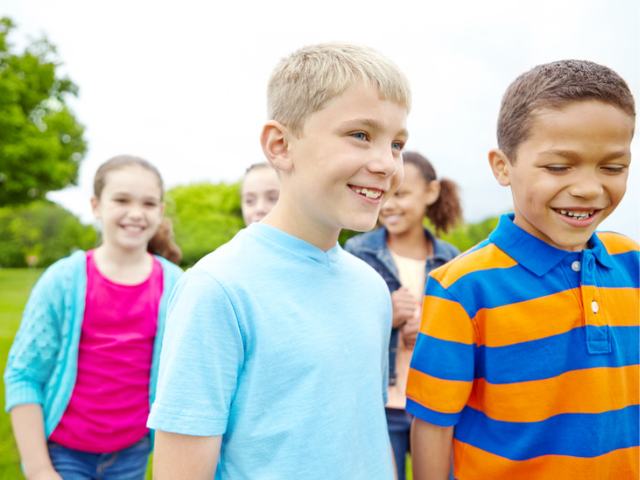Social skills for kids start developing from the time we are born through interacting with our parents. However, as our lives become more complex, so do our social connections and expectations. That’s why it’s important to ensure our children pick up healthy social habits, which they will likely take into adulthood. If your child is not learning the right social skills, then it will not matter how much time your child spends with others. There are three key elements your little one should learn to foster healthy communication: 1.) Self-control 2.) Empathy, and 3.) Verbal communication.
Here are six ways to help guide your child in the right direction regarding positive interactions with others to develop healthy social skills for kids.
Six Ways to Teach Social Skills for Kids
1. Teach your Child about Feelings
If your child doesn’t understand how their behavior affects others, they probably won’t see a reason to act any differently. Learning empathy lowers the chance of your child acting negatively toward others. Learning empathy can also help others better, like your child, understand how they feel. One way to help your child develop empathy is by discussing their feelings with them. Ask them what makes them feel happy and sad and why. Your child may learn better coping skills by explaining that emotions are normal and what triggers them. Empathy is a key social skill for kids.
2. Be a Role Model of Positive Emotions
Sure, even adults have bad days and feel irritable. However, since we (should) have a better ability to keep our emotions in check, we can guide our child’s behavior by example. If your child does something you don’t like, you can calmly explain why it’s wrong rather than resorting to yelling. Children mimic our behavior from an early age, and how we react to situations and deal with others can have a positive (or negative) impact on how our children learn to interact. Learning how to react in these situations is a needed social skill for kids. Good role models can leave a positive impression on your child for life.
3. Provide Age-Appropriate Guidance
As parents, we should first identify the stages of social development to optimize how they can positively influence our children. While every child develops at their own pace, knowing what social cues your little one should be picking up on could help you place more focus on that social skill. For example, 2 to 3-year-olds are usually able to use greetings such as “hi” or “bye.” While 5-and 6-year-olds can often identify behavior they don’t approve of and say, “stop.” By age 7, your child can start learning the kind of empathy that makes them cry at another’s situation. As we noted previously, empathy is a key social skill for kids. This guideline can also help identify a child struggling with social anxiety.
4. Use Fun Games
Certain games and activities aimed at kids can help develop social skills for kids. For example, The Name Game helps children learn to address someone before engaging in conversation. If you don’t remember this game, it goes something like this: children form a circle, and one of the children has a ball. Ask the child to name someone in the group and roll the ball to them. You could try a variation by having the children say something about themselves when they receive the ball.
5. Teach them Humility
Again, this is probably something that should be reserved for older children. However, teaching humility can go a long way in helping your little one make friends and play nice with others. While learning cues such as smiling and listening to others is important, “being able to laugh at yourself” is also an important social skill for kids to keep friends. In short, humility is the ability to remain humble.
6. Identify any Social or Emotional Problems
You may do everything you can to bestow positive social behavior on your child, but they could still be acting out or not getting along with others. If this type of pattern persists, your child may need a visit to the pediatrician to determine if they have a social disorder. One growing problem in children is Attention Deficit Hyperactivity Disorder (ADHD), which can affect how your child treats others and focuses on tasks. According to research, treating the behavior in the same environment the child is having trouble in is best. For example, if they’re acting out in class, then focus on getting them more engaged in classroom activities (with the help of teachers).



